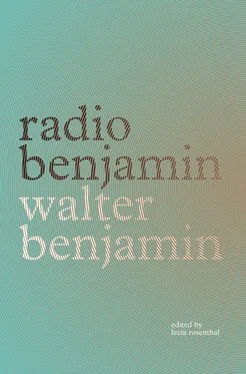Of course, this was not always the case. I will now read you a Berlin story from a time when Berlin was not yet a city of four million people, but just a few hundred thousand.
BRUSHMAKER ( carrying his brushes and brooms, but so drunk that he’s forgotten what he’s actually selling ). Eels here! Eels here! Get your eels here! Who’s got cash!
FIRST BOOTBLACK: Listen up, Sir Scrubber, whoever eats a couple eels gets swept away. ( He leaves the drunkard and runs madly through the streets, screaming .) Holy cow, this one takes the cake! No more smokin’ from the window!
SEVERAL PEOPLE: What are you talkin’ about? Really? You can’t smoke from the window anymore? Now they’ve gone too far.
FIRST BOOTBLACK ( running away ): Yep! You gotta smoke from a pipe! — Hah!
BRISICH THE LOAFER ( in front of the museum ): I like this building, it cracks me up.
LANGE THE LOAFER: How come it cracks you up?
BRISICH ( staggering a bit ): Well, because of the eagles on top!
LANGE: What’s so funny about the eagles?
BRISICH: Well, they’re royal eagles but still they sit there loafin’ on the corner! Just think if I was a royal eagle and got to loaf on the corner of the museum just for decoration! I tell you what I’d do. If I was thirsty, I’d quit my decorating for a while and pull out my bottle, take a couple swigs and holler down to the people: “Don’t think bad about the museum! A royal eagle’s just takin’ a break!” 9
All languages change quickly, but the language of a metropolis changes much more quickly than does language in rural regions. Now, compare the language you just heard to that of a crier in a story from today. The man who wrote it is named Döblin, the same Döblin who told you about Berlin one Saturday not long ago. 10Of course, he wouldn’t have heard it exactly as he wrote it. He often just hung around Alexanderplatz and listened to the people hawking their wares and then cobbled together the best bits of what he heard:
How come the elegant man in the West End wears a tie and the prole wears none? Gentlemen, come closer, you too Fräulein, that’s right, the one with the man on your arm, and minors are allowed too, they’re for free. Why are there no ties on a prole? Because he can’t tie ‘em. So he buys himself a tie-holder and once he’s got it, it’s no good ‘cuz he can’t tie it. It’s a scam and it embitters the masses and sinks Germany into even deeper misery than she’s in already. Tell me, for example, why no one wears these big tie-holders? Because no one wants to tie a dustpan around his neck. Not men, not women, not babies if they had a say. It’s no laughing matter, gentlemen, laugh not, we don’t know what goes on in that sweet little baby brain. Dear God, the sweet little head, what a sweet little head, with its little hairs, but what’s not pretty, gentlemen, is paying your alimony, that’s no joke, that gets a man into trouble. Go buy yourself a tie at Tietz or Wertheim, or somewhere else if you won’t buy from Jews. I’m an Aryan man. The big department stores don’t need me to pitch for ‘em, they do just fine without me. So buy yourselves a tie like I have here and then think about having to tie it every morning. Ladies and gentlemen, who has time nowadays to tie a tie in the morning and give up an extra minute of precious sleep? We need all the sleep we can get because we all work so much and earn so little. A tie-holder like this makes you sleep easier. It’s putting pharmacists out of business, because whoever buys one of these here tie-holders needs no sleeping potion, no nightcap, no nothin’. He sleeps safe and sound like a baby at his mother’s breast, because he knows there’s no hustle in the morning; what he needs is right there on the dresser, tied and ready, just waitin’ to be shoved into his collar. You spend your money on so much rubbish. You must have seen the crooks last year at the Krokodil Bar, there was hot sausage in front, and behind lay Jolly in his glass case, with a beard like sauerkraut growing around his mouth. 11Every one of you saw it — come a little closer, now, I wanna save my voice, I haven’t insured my voice, I’m still saving up for the down payment — how Jolly was lying in the glass case, you all saw it. But how they slipped him some chocolate? You didn’t see that! You’re buyin’ honest goods here, not celluloid, but galvanized rubber, twenty pfennigs apiece, fifty for three. 12
This shows you just how useful the Berlin Schnauze can be, and how someone can earn his money with it, drumming up as much interest in his ties as if he were running an entire department store.
Thus a language renews itself every second. All events, great and small, leave their mark on it. War and inflation as much as a Zeppelin sighting, Amanullah’s visit, or Iron Gustav. 13There are even speech fads in Berlinish. Perhaps some of you still remember the famous “to me.” For example: if a Berliner is being chatted up by someone he doesn’t want to talk to, he says, “That’s Kaiser Wilhelm Memorial Church to me,” which means “nave.” And, as everyone knows, a “knave” is a scoundrel. Or someone is giving an order to a young boy and says to him, “Can you manage it?” And the boy replies, “That’s abacus to me.” (You can count on me.)
By now you will have noticed that in many of these stories, there’s more to Berliners than just the big Schnauze. For instance, people can be very impertinent yet also very awkward. Berliners, however, at least the better ones, combine their impertinence with a whole lot of quick wit, spirit, and jest. “A Berliner ain’t never taken for a fool,” as they say. Take, for example, the nice story of the fellow, who’s in a great hurry and riding in a horse-drawn carriage that’s going too slow: “My God, driver, can’t you move a little faster?” “Sure thing. But I can’t just leave the horse all alone.” But a true Berliner joke is never only at the expense of others; it’s just as much at the jokester’s expense. This is what makes him so likable and free: he doesn’t spare his own dialect, and there are many wonderful stories to prove it. For example, a man, already a bit drunk, walks into a bar and says: “What ales you got?” And the barkeep replies: “I got gout and a bad back.” 14
And now for the stories I promised you about children. Three boys enter a pharmacy. The first one says: “Penny o’ licorice.” The shopkeeper fetches a long ladder, climbs to the top step, fills the bag, and climbs back down. Once the boy pays, the second boy says: “I’d also like a penny o’ licorice!” Before climbing the ladder again, the shopkeeper, already annoyed, asks the third boy: “You want a penny of licorice, too?” “Nope,” he says. So the shopkeeper climbs back up the ladder, and then down again with the full bag. He now turns to the third boy: “And what do you want, lil’ man?” And he answers: “I want the licorice for a ha’penny.” Or, a man sees a young boy on the street: “Huh, smokin’ already? I’m gonna tell your teacher.” “Do what you want, you old fool, I ain’t big enough for school yet.” Or, there’s a fifth-grader at school who can’t get used to calling his teacher “sir.” The teacher’s name is Ackermann and he lets it pass for a while until finally he gets angry: “By tomorrow morning you’ll write in your notebook 100 times: ‘I shall never forget to call my teacher “sir.””‘ The next day the boy comes to school and gives his teacher the notebook, in which indeed he has written 100 times: “I shall never forget to call my teacher ‘sir.’ ” The teacher counts and, sure enough, there’s 100. And the boy says: “What’s up, Ackermann, surprised?”
We’ll hear some more Berlinish another time if you want, but there’s surely no need to wait. Just open your eyes and ears when you’re walking through Berlin and you’ll collect many more such stories than you’ve heard on the radio today.
Читать дальше












